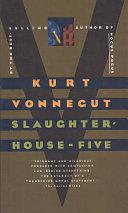Quotes from book
Slaughterhouse-Five

Slaughterhouse-Five, or The Children's Crusade: A Duty-Dance with Death is a science fiction-infused anti-war novel by Kurt Vonnegut, first published in 1969. It follows the life and experiences of Billy Pilgrim, from his early years to his time as an American soldier and chaplain's assistant during World War II, to the postwar years, with Billy occasionally traveling through time itself. The text centers on Billy's capture by the German Army and his survival of the Allied firebombing of Dresden as a prisoner-of-war, an experience which Vonnegut himself lived through as an American serviceman. The work has been called an example of "unmatched moral clarity" and "one of the most enduring antiwar novels of all time".

Billy writing a letter to a newspaper describing the Tralfamadorians
Slaughterhouse-Five (1969)
Context: The most important thing I learned on Tralfamadore was that when a person dies he only appears to die. He is still very much alive in the past, so it is very silly for people to cry at his funeral. All moments, past, present and future, always have existed, always will exist. The Tralfamadorians can look at all the different moments just that way we can look at a stretch of the Rocky Mountains, for instance. They can see how permanent all the moments are, and they can look at any moment that interests them. It is just an illusion we have here on Earth that one moment follows another one, like beads on a string, and that once a moment is gone it is gone forever.
When a Tralfamadorian sees a corpse, all he thinks is that the dead person is in bad condition in the particular moment, but that the same person is just fine in plenty of other moments. Now, when I myself hear that somebody is dead, I simply shrug and say what the Tralfamadorians say about dead people, which is "So it goes."

Billy writing a letter to a newspaper describing the Tralfamadorians
Slaughterhouse-Five (1969)
Context: The most important thing I learned on Tralfamadore was that when a person dies he only appears to die. He is still very much alive in the past, so it is very silly for people to cry at his funeral. All moments, past, present and future, always have existed, always will exist. The Tralfamadorians can look at all the different moments just that way we can look at a stretch of the Rocky Mountains, for instance. They can see how permanent all the moments are, and they can look at any moment that interests them. It is just an illusion we have here on Earth that one moment follows another one, like beads on a string, and that once a moment is gone it is gone forever.
When a Tralfamadorian sees a corpse, all he thinks is that the dead person is in bad condition in the particular moment, but that the same person is just fine in plenty of other moments. Now, when I myself hear that somebody is dead, I simply shrug and say what the Tralfamadorians say about dead people, which is "So it goes."